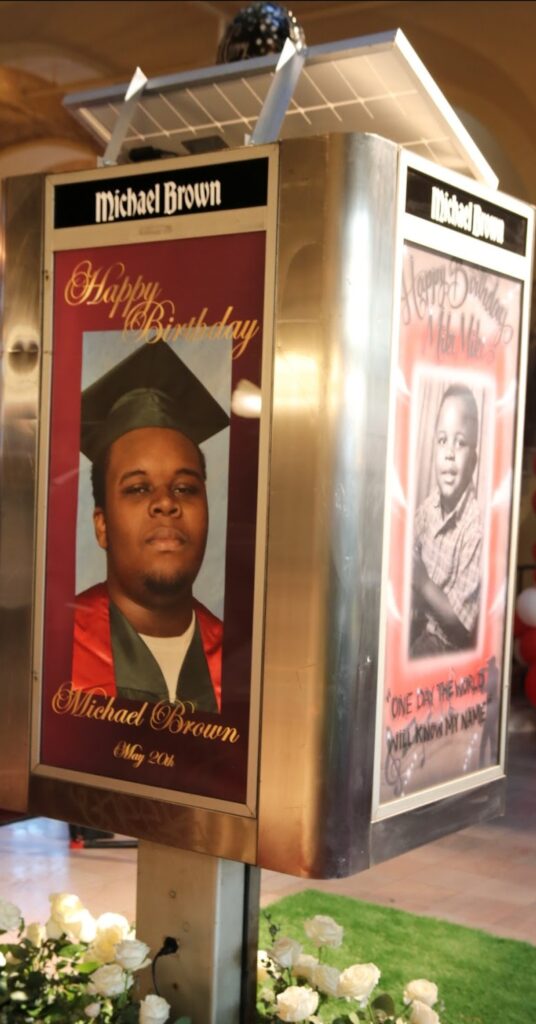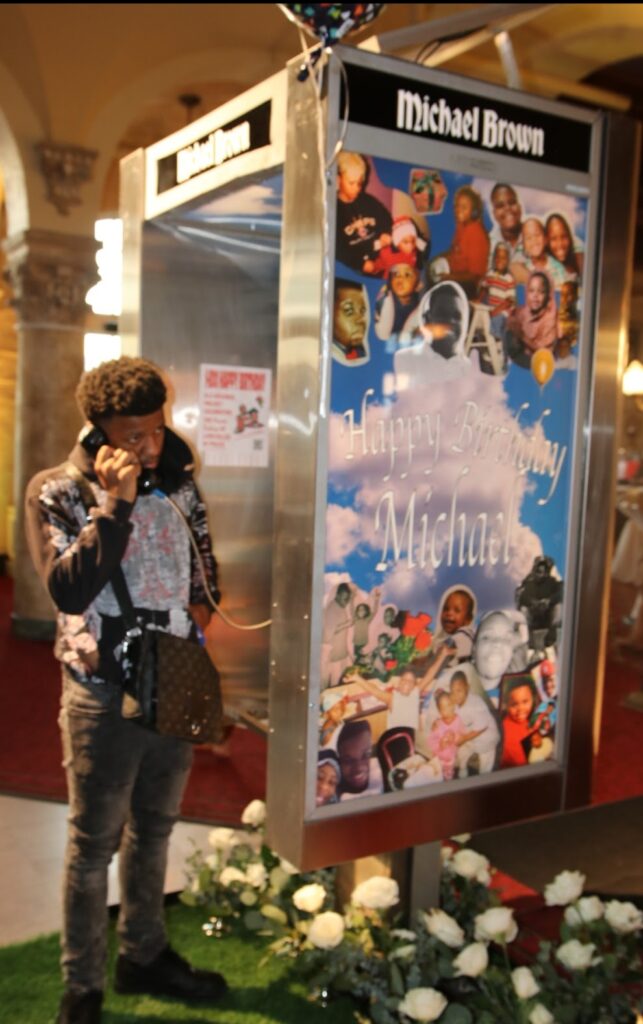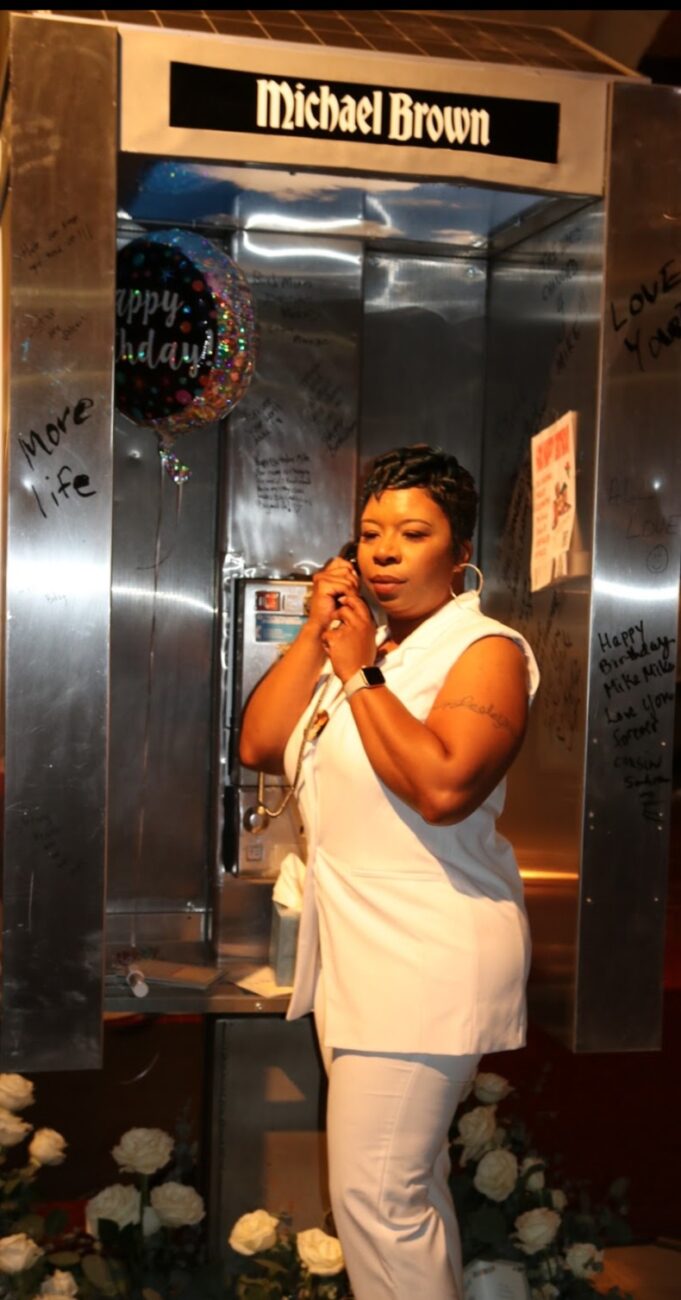ST. LOUIS—The Michael O.D. Brown Foundation hosted a private birth anniversary celebration for Mike Brown Jr., commemorating what would have been his 28th birthday with family and friends on May 20.
The day began with prayer at his grave site where his mother, Lezley McSpadden-Head, released 28 white doves. Later that evening the commemoration continued at the Elegant Barnett on Washington Avenue, with the release of 28 more doves.
It was a night of love, dancing, fun, laughter and reflections on Michael Brown Jr., who is affectionately called “Mike Mike.” When the guests arrived at the private event, they were greeted at the door and given a button with a photo of Mike Brown Jr. and his mother from his first birthday party.
Donovan Meeks, who supplied the doves for the special occasion, said the night was very healing. “I can’t wait to thank Lezley for inviting me to their private event. Normally, I am so busy, but I was able to attend, and it was needed for me and [was] spiritually rejuvenating,” he said.

A phone booth was placed in the main entrance for people to listen to messages left over the years for Mike Brown Jr. The first message heard was a warm heartfelt message from Ms. McSpadden-Head to her son and there were hundreds of messages of sentimental reflections.
Guests were able to call a special number to leave voice messages. His mother’s voice answers at the number, stating “…we miss Michael every day and we are still seeking justice. Please press 1 to leave a voicemail for Michael, God Bless.” The phone booth had photos of the young Black man on three sides with messages written on the steel surface with flowers at the base of the booth.
On August 9, 2014, in Ferguson, Missouri, a city in St. Louis County, the unarmed 18-year-old Mike Brown Jr. was shot and killed by former Ferguson police officer Darren Wilson. His death ignited the Ferguson uprising after the White officer was not indicted in the teenager’s death on November 24, 2014.
In a 2014 message, the Honorable Minister Louis Farrakhan described the events of Ferguson as the microcosm of the macrocosm, and that it had reached the boiling point. “Black men are being shot down, but the courts don’t give us justice,” said the Minister.
“The shooting of this young man has triggered a response that has been building,” he said in an August 17, 2014, message from Mosque Maryam in Chicago, titled, “The Troubled World: What Should We Be Doing?”

In an emotional interview, Ms. McSpadden-Head spoke of her son’s loving personality. “He was my baby, my first one, courageous, outgoing, loved people, animals [and] soft-spoken. He just made people draw to him and like being around him,” she recalled.
Over the past 10 years, Ms. McSpadden-Head has focused not on the death of her son but rather on his life. She is not only fighting for justice for her son but also fights for every mother who has lost her children to police-involved killings.
On the Michael O.D. Brown website, Ms. McSpadden-Head shares how she intends to secure her son’s legacy. “The most important thing to me is to secure the lives of other children. My son is gone. I can’t bring him back. But how can we put something in place where other children are protected?” she said.
Mr. Justin Hansford is a Howard University law professor and is a board member of the Michael O.D. Brown We Love Our Sons and Daughters Foundation. Mr. Hansford also attended the celebration. He shared with The Final Call how Mike Brown Jr.’s mother is pushing for justice and change with a mental health bill that is critical to begin addressing the psychological wounds inflicted by racist policing.
“As someone who has been on the front lines fighting against police brutality for over a decade, I know all too well the immense psychological toll that abusive policing practices can take on communities of color. … Mike Brown’s [death] sparked an uprising that exposed the deep-seated racism and trauma that had been festering for decades under the surface,” he said.
In the aftermath of the Ferguson uprisings, Mr. Hansford expressed how the community was devastated by the militarized response from law enforcement that re-traumatized residents.
“People were left with anxiety, PTSD, depression, and a pervasive sense of hopelessness in the face of such entrenched systemic injustice. The need for mental health support was overwhelming, but the resources simply weren’t there,” he explained.
“I’m a strong supporter of this new bill to provide millions in subsidies for trauma-informed mental healthcare services in Ferguson and other communities that have been the target of federal police brutality investigations. It acknowledges the real human costs of systemic racism and … this legislation is about taking concrete steps to dismantle the legacy of slavery that has an impact on our bodies and our minds.”
For more information about the proposed bill and the legacy of Michael “Mike Mike” Brown, visit michaelodbrown.org.













